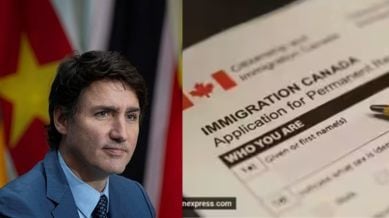Hours after his government announced the withdrawal of 41 diplomats from India, Canadian Prime Minister Justin Trudeau, in remarks Friday that will deepen the diplomatic row between the two countries, targeted the Indian government for making “life as usual” “unbelievably difficult” for “millions of people” in India and Canada.
Earlier, Canada’s Foreign Minister Melanie Joly announced that 41 Canadian diplomats and their 42 family members had been withdrawn from India since they were “in danger of having immunity stripped on an arbitrary date” and that would have “put their personal safety at risk”.
She said Canada had “facilitated their safe departure from India” and had halted its visa and consular services in Chandigarh, Mumbai and Bengaluru, and that these services would now be available only at the Canadian High Commission in New Delhi.
Speaking in Ottawa, Joly took a swipe at India, saying “unilateral revocation of the diplomatic privilege and immunity is contrary to international law and a clear violation of Geneva Convention on diplomatic relations. Threatening to do so is unreasonable and escalatory”.
Her remarks drew a sharp response from Delhi with the Ministry of External Affairs rejecting Canada’s “attempt to portray the implementation of parity as a violation of international norms”. It accused Canadian diplomats in India of “continued interference in our internal affairs”.
Last month, India had sought parity with Canada, asking it to downsize its diplomatic staff in the wake of the row over Trudeau’s allegation of a potential India government link to the killing of Khalistan separatist Hardeep Singh Nijjar.
Delhi had asked Ottawa to withdraw about 40 of its diplomats to bring parity with the Indian diplomatic presence in Canada – India has about 20 diplomats in Canada.
Story continues below this ad
Following Joly’s remarks, Trudeau, at a televised press conference in Brampton, Ontario, criticised Delhi’s actions.
The Reuters news agency quoted Trudeau saying, “The Indian government is making it unbelievably difficult for life as usual to continue for millions of people in India and in Canada. And they’re doing it by contravening a very basic principle of diplomacy.”
“It’s something that has me very concerned for the well-being and happiness of millions of Canadians who trace their origins to the Indian subcontinent,” he said.
In New Delhi, sources say India’s decision to seek parity was conveyed to Canada around a month ago, with a target implementation date of October 10. This date was extended until October 20 as details and modalities of implementation, including the list of Canadian diplomats who would continue to be accorded diplomatic immunities and privileges, were being worked out in consultation with the Canadian side.
Story continues below this ad
Attempts by Canada to portray this as an “arbitrary” and “overnight” decision, the sources said, were inaccurate.
Earlier this month, UK-based daily Financial Times reported that Joly held a “secret meeting” with External Affairs Minister S Jaishankar in Washington DC in September. “Ottawa was trying to resolve the situation with New Delhi, which had warned that diplomats who stayed beyond the deadline would lose diplomatic immunity, said several people familiar with the situation. One Canadian official said Ottawa had not withdrawn any diplomats ahead of the deadline,” the FT report stated.
In a statement Friday, the MEA said, “The state of our bilateral relations, the much higher number of Canadian diplomats in India, and their continued interference in our internal affairs warrant a parity in mutual diplomatic presence in New Delhi and Ottawa.” It said they have been “engaged with the Canadian side on this over the last month in order to work out the details and modalities of its implementation”.
The MEA said its actions in implementing parity were fully consistent with Article 11.1 of the Vienna Convention. It cited the convention on diplomatic relations: “In the absence of specific agreement as to the size of the mission, the receiving State may require that the size of a mission be kept within limits considered by it to be reasonable and normal, having regard to circumstances and conditions in the receiving State and to the needs of the particular mission.”
Story continues below this ad
Canada said India’s decision will impact the levels of services to consulates in both countries. “Unfortunately, we have to put a pause on all in-person services in our Consulates in Chandigarh, in Mumbai and in Bangalore,” Joly said. “Canadians who need consular assistance can still visit our High Commission in Delhi. And you can still also do that in person by phone and by email,” she said.
Hours after withdrawing its diplomats, Canada updated its travel advisory for India, warning its citizens of the possibility of “anti-Canada protests” as well as “intimidation or harassment”.
The cut in consular services will lead to a significant slowdown of Indian visa applications for Canada, a huge chunk of which comprises Indian students seeking visas to study in Canadian universities. In 2022, India was the top country for permanent residents, temporary foreign workers, and international students in Canada.
The Immigration, Refugees and Citizenship Canada (IRCC), which is responsible for processing visas, said it is reducing its number of employees in India from 27 to 5. “Due to the decrease in Canadian diplomatic staff in India, Indian citizens would face delays in overall processing times, responses to enquiries and getting visas or their passports back,” the IRCC said.
Story continues below this ad
Tensions flared between India and Canada following Trudeau’s allegations about potential involvement of Indian agents in the killing of Nijjar. India rejected the allegations as “absurd” and “motivated” and also temporarily suspended visa services for Canadian citizens.
